This report provides the findings from the annual survey of supply teachers in Wales and highlights the experiences of supply teachers during the academic year 2023/24
Introduction
The survey
Nature of work
Access to work
Availability of work
Experiences of supply teachers when undertaking work in schools
Experiences with schools, staff, parents and pupils when undertaking assignments
Provision of key information when undertaking assignments
Issues and concerns, including health and safety, for supply teachers
Rates of pay for supply teachers
Financial situation
Pensions
The National Supply Pool for Wales
Conclusion
Introduction
Supply teachers are integral to the education system. Without supply teachers, many pupils would be denied the opportunity to be taught by qualified and dedicated teachers who ensure that schools can continue to provide the education to which children and young people are entitled. Supply teachers make a vital contribution to securing high educational standards for all children and young people.
NASUWT’s annual survey of supply teachers in Wales aims to examine the changing experiences of supply teachers, including issues and trends.
The 2023/24 survey was undertaken between July and August.
A total of 102 supply teachers responded to the survey.
The survey
Nature of work
Supply teachers were asked why they carried out supply teaching work.
The top five reasons cited by supply teachers were:
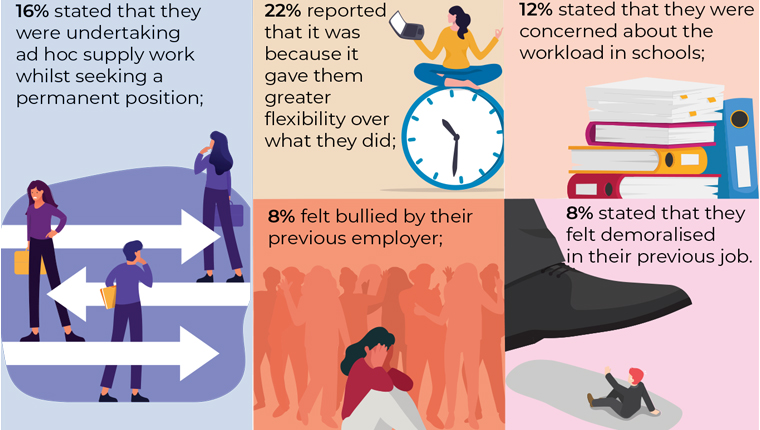
I had to sign up with multiple agencies to get enough work.
When asked what other advantages/disadvantages were associated with being a supply teacher, a third of supply teachers (33%) cited the lack of job/ financial security, 14% cited no planning/marking, a further 14% cited the freedom to choose which school to work in, just under one in ten (8%) cited being able to go on cheaper holidays, and another 8% cited the ability to get a feel for different schools.
Supply teachers were asked about the ability to secure work teaching during the academic year 2023/24. Just over two fifths (42%) reported that they had no problem securing work, whereas over two fifths (43%) reported that they had problems securing work. However, over one in ten supply teachers (11%) reported that they had significant problems getting supply work, and just under one in 20 (4%) reported that they had not been able to secure any supply work.
Most weeks, I only got one or two days. Some weeks, I got nothing. I had significant distance to travel to get to work and only got paid £10 petrol when I had accepted a job 1.5 hours away.
I had to take teaching assistant work as there was not enough supply teaching work available.
Access to work
During the academic year 2023/24, just over a fifth of supply teachers (21%) reported that they were working for one school, 6% reported that they were working for two schools, just over one in ten (11%) reported that they were working for three schools, 13% reported that they were working for four schools, and one in ten (10%) reported that they were working for five schools. Just under two fifths of supply teachers (39%) reported that they were working for more than five schools.
I had six schools that used me regularly or for stints of longer supply work. There were many more where I did one or two days there.
Of those supply teachers who reported that they were able to secure work during the academic year 2023/24, over four fifths of supply teachers (83%) said that they had secured work through a supply agency, whilst 14% reported that they had secured work directly as a supply teacher by a school, and under one in 20 (3%) stated that they had secured work via a local authority supply pool.
For those supply teachers working through an agency during the academic year 2023/24, well in excess of half (55%) stated that they were signed up to one agency to secure work, a quarter (25%) reported that they were signed up to two agencies, one in ten (10%) reported that they were signed up to three agencies, and just over one in 20 (6%) reported that they had signed up to four agencies. Just under one in 20 (4%) reported that they were signed up to five agencies.
For those supply teachers working through a local authority during the academic year 2023/24, over three quarters (78%) reported that they were signed up to one local authority, 13% reported that they were signed up to two local authorities, 3% reported that they were signed up to three local authorities, and a further 3% stated that they were signed up to four local authorities. Another 3% reported that they were signed up to five local authorities.
For those supply teachers working directly for a school during the academic year 2023/24, under two thirds (64%) stated that they were employed by one school, 8% stated that they were employed by two schools, a further 8% stated that they were employed by three schools, and 16% stated that they were employed by four schools. Just under one in 20 (4%) stated that they were employed by five schools.
Just over a fifth of supply teachers (21%) stated that this was more than during the previous academic year, whereas just under a fifth (19%) reported that this was less, and three fifths (60%) stated that it had stayed the same.
I worked on maternity cover through the agency for the first four months. I was then on a contract through the LA for the rest of the academic year.
I have had to join a second agency due to lack of work.
I signed up with one or two agencies last year, but they either provided no work or work that was too far away.
A fifth of supply teachers (20%) reported travelling between 0-10 miles for an assignment, over a quarter (28%) reported travelling between 11-20 miles, just over a fifth (21%) reported travelling between 21-30 miles, just under a fifth (19%) reported travelling between 31-40 miles for an assignment, and one in 20 (5%) reported travelling between 41-50 miles. Three per cent of supply teachers reported travelling between 51-60 miles for an assignment, 1% reported travelling between 61-70 miles, a further 1% reported travelling between 71-80 miles, and another 1% reported travelling between 81-90 miles. Another 1% of supply teachers reported travelling in excess of 100 miles during the academic year 2023/24.
Nineteen per cent of supply teachers reported that they had to travel further than in previous years in order to secure work.
Just over three fifths of supply teachers (62%) stated that the cost of living crisis had a detrimental impact on how far they were willing to travel to undertake an assignment.
Availability of work
Supply teachers were asked where they were able to obtain work during the academic year 2023/24.
Just under a third of supply teachers (31%) stated that their supply work took place in primary schools, well over a third (37%) stated that their work was in secondary schools, and one in ten (10%) reported that their supply work took place in a special school/pupil referral unit (PRU).
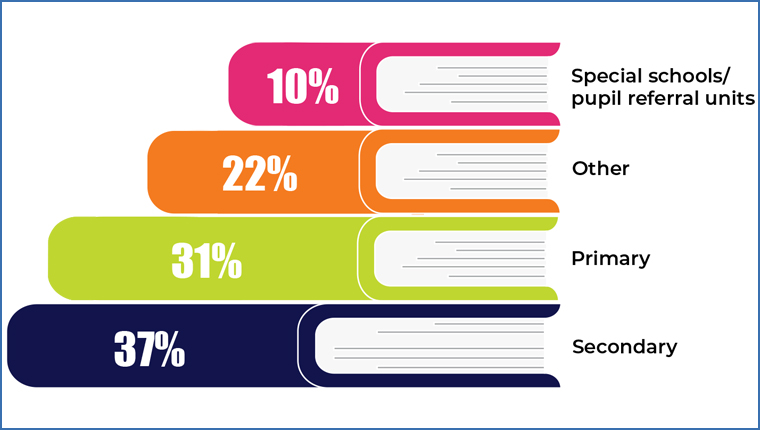
For those supply teachers who reported that they were able to secure work during the academic year 2023/24, well over half (57%) reported that the majority of their supply teaching was ad hoc/daily work, just one in ten (10%) said that this was weekly assignments, and 1% stated that this was monthly assignments. Just over one in 20 supply teachers (6%) reported that the majority of their work was termly assignments and just over a quarter (26%) stated that the majority of their teaching was on longer term assignments in excess of a term.
When supply teachers were asked how many days on average they were able to obtain work during the academic year 2023/24, 15% said they obtained work one day a week, just under a quarter (23%) two days a week, and just over a fifth (21%) three days a week. Fourteen per cent of supply teachers in the survey said they were able to obtain work four days a week and over a quarter (27%) stated that they were able to obtain work five days a week. However, well in excess of four fifths of supply teachers (86%) stated that they wanted to work between three to five days a week.
Well in excess of two fourths of supply teachers (44%) stated that the amount of supply work had decreased during the academic year 2023/24 when compared to the previous academic year, whereas just 18% stated that the amount of supply work had increased. Just under two fifths of respondents (38%) stated that the opportunities had stayed the same.
2021/22 was very good. I was routinely kept going five days per week. From January 2023, I noticed a drop off. Things became inconsistent/more haphazard. But a noticeable drop off came in September 2023, which deteriorated so badly in 2024 that I had no supply income in January.
I have been inundated with work most years, but this year has been a lot less work.
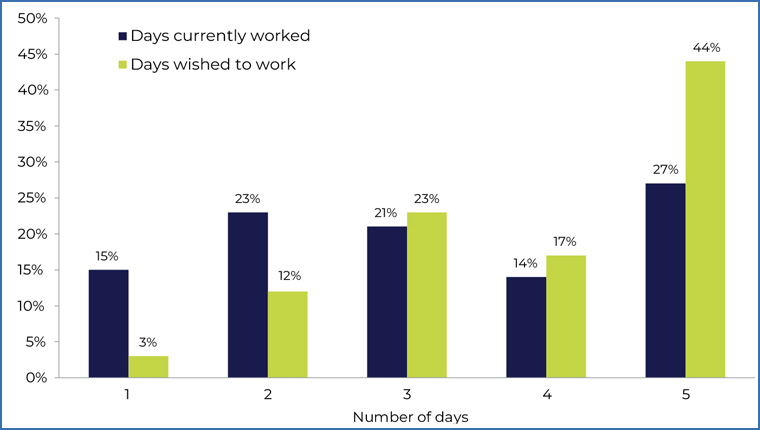
Experiences of supply teachers when undertaking work in schools
Supply teachers were asked about their experiences when working during the academic year 2023/24.
Despite it being a legal requirement since April 2020, just 29% of supply teachers who obtained work through a new supply agency reported that they had been provided with a Key Information Document (KID), detailing how they would be paid, associated deductions, as well as other key details, and well in excess of two fifths (44%) stated that they did not know whether or not they had been provided with a KID by the agency.

I was not supplied a KID or told about it; however, I have seen an example of it on the agency portal, but not specific to my rate of pay.
To be fair, so far, I have always been paid in a transparent, professional and reliable manner, on time and correctly.
Just under one in 20 supply teachers (4%) stated that they had been asked to undertake a ‘free trial’ by an agency at a school prior to undertaking paid work.
Fourteen per cent of supply teachers stated that work had been cancelled on specific longer term assignments at, or approaching, the 12 week qualification period for the Agency Workers Regulations (AWR).
The school told me they wouldn’t pay me the 13 week equal pay. IntroTeach have never mentioned or asked for me to be paid correctly after 12 weeks. The school said they would find someone else if I didn’t want to be paid at the normal agency rate.
Just over half of supply teachers (51%) reported that an agency had suddenly and unexpectedly terminated a booking in the last 12 months.
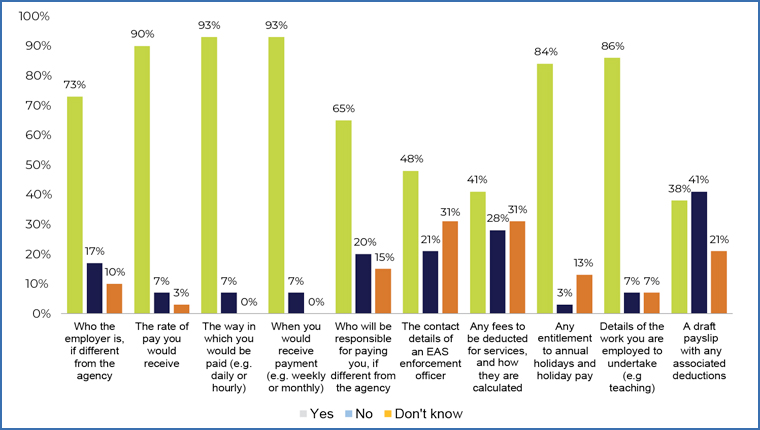
Experiences with schools, staff, parents and pupils when undertaking assignments during the 2023/24 academic year
Just under half of supply teachers (49%) reported that they are always made to feel welcome by the school and well in excess of two fifths (46%) stated that they are often made to feel welcome by the school. However, 3% said that they are rarely made to feel welcome by the school and 2% reported that they are never made to feel welcome by the school.
When asked how welcome they are made to feel by the teaching staff in schools, just over a third of supply teachers (35%) reported that they are always made to feel welcome and well in excess of two fifths (46%) reported that they are often made to feel welcome by the teaching staff in schools. However, 15% of supply teachers stated that they are rarely made to feel welcome by the teaching staff in schools and just under one in 20 (4%) reported that they are never made to feel welcome by the teaching staff in schools.
When asked how welcome they are made to feel by the support assistants in schools, 16% of supply teachers reported that they are always made to feel welcome and just under three fifths (58%) reported that they are often made to feel welcome by the support assistants in schools. However, just over a quarter of supply teachers (26%) stated that they are rarely made to feel welcome by the support assistants in schools.
When asked how welcome they are made to feel by the administrative staff in schools, just under three fifths of supply teachers (59%) reported that they are always made to feel welcome and just under a quarter (23%) reported that they are often made to feel welcome by the administrative staff in schools. However, just under one in ten (9%) reported that they are rarely made to feel welcome by the administrative staff in schools and a further 9% reported that they are never made to feel welcome by the administrative staff in schools.
When asked how welcome they are made to feel by the pupils in schools, a third of supply teachers (33%) reported that they are always made to feel welcome and 30% reported that they are often made to feel welcome by the pupils in schools. However, another 30% of supply teachers reported that they are rarely made to feel welcome by the pupils and 7% stated that they are never made to feel welcome by the pupils.
In respect of being made to feel welcome by the parents, just over one in ten supply teachers (11%) stated that they are often made to feel welcome. However, well in excess of half (56%) stated that they are rarely made to feel welcome by the parents and a third (33%) stated that they are never made to feel welcome by the parents.
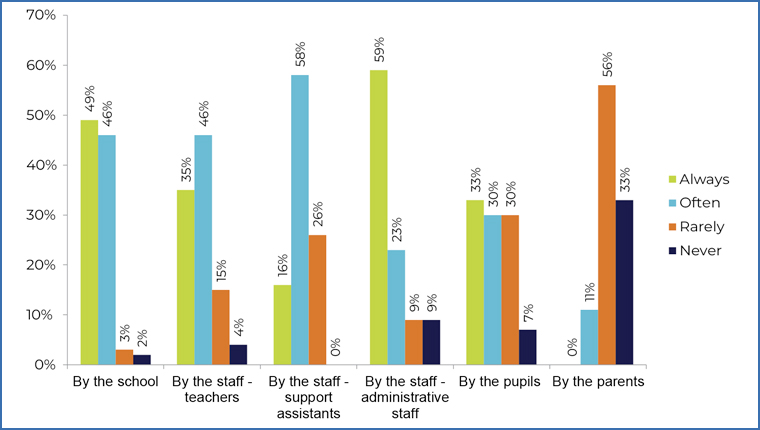

Just under nine out of ten supply teachers (89%) indicated that they had reported the incident/s to someone in the school; however, of those who did report the incident, 14% stated that no action was taken against the pupil and over a quarter (28%) stated that they didn’t know or were not informed whether or not any action was taken.
Dealt with appropriately by the school. Pupil given a fixed term exclusion.
I’ve been verbally abused and aggressively confronted by secondary students. I’ve also been treated badly by school receptionists and teaching assistants.
Provision of key information when undertaking assignments
Of those supply teachers able to secure work during the 2023/24 academic year, well in excess of half (57%) stated that they were not given the school’s overall risk assessment and 16% stated that they were not sure.
Just under a third of supply teachers (32%) stated that they were not told the arrangements for supply teachers to report safely to the workplace and almost two thirds (64%) stated that they were not given the details of any procedures and protective measures in regards to Covid-19, including any financial support available.
Just under three fifths of supply teachers (59%) stated that they were not provided with the details regarding access to, and availability of, hand sanitiser and 60% reported that they were not provided with the details in place to ensure classrooms and work areas were well ventilated.
Over a fifth (22%) stated that they were not provided with the details of any designated contact(s) for any questions, problems or emergencies and over one in ten supply teachers (12%) reported that they were not given the details of who and where to report to each day, including details of the signing in process.
Over a third of supply teachers (36%) reported that they were not provided with the details of how to raise any concerns about health and safety and 37% reported that they were not provided with the details of how to call for assistance, including first aid. Furthermore, just over three fifths of supply teachers (61%) reported that they were not provided with the details of the nearest first aid room or appropriate area.
In regards to the school’s fire evacuation plans, including routes and procedures, over a third of supply teachers (36%) reported that this was not provided to them when undertaking assignments in schools during the 2023/24 academic year.
Thirty-six per cent stated that they had not been given a tour of the school site, including identifying where they would be teaching when undertaking assignments in schools.
In respect to the timetable, including breaks and lunch periods, as well as expectations on staff during such times, 15% of supply teachers reported that information regarding this had not been provided to them when undertaking assignments in schools.
Just under two fifths of respondents (38%) reported that they had not been provided with the details of the registration process and expectations for the appropriate movement of pupils around the school site between lessons, at breaks and at lunchtimes, and at the end of the school day when undertaking assignments during the 2023/24 academic year.
In regards to teaching, just under half of supply teachers (49%) reported that they were not provided with details of how to access relevant information on schemes of work for the subjects they were expected to teach and over two fifths (43%) reported that they had not been provided with access to relevant teaching materials.
In the long term placement, I received all of the above; however in the short term and day to day placements, I received very little information regarding the schools.
In addition, just under a third of supply teachers (31%) stated that they were not provided with the details regarding access to computers, with login details and what to do at the end of the school day and well over half (57%) reported that they were not provided with the details of any resources they might reasonably be expected to provide to students, such as pens.
Under half of respondents (47%) stated that they were not provided with a list of the pupils in the class(es) they would be teaching, including details of any medical conditions, behavioural issues or special educational needs and disabilities (SEND) and just over three fifths of supply teachers (61%) stated that they had not been provided with the details of any pupils known to be potentially violent and how this should be managed.
Furthermore, 45% of supply teachers reported that they had not been provided with the behaviour management policy when undertaking assignments in schools, including who to contact.
Two fifths of supply teachers (40%) reported that they had not been provided with the details of any events, meetings or specific activities taking place and under three fifths (57%) stated that they had not been provided with the arrangements for school transport, as appropriate, when undertaking assignments during the 2023/24 academic year.
When I ask for any of the above, I am usually given them. I have told the agent numerous times that they need to inform schools that supply teachers must be given/left certain information and resources, but it rarely happens.
This varies from school to school. Some schools will give you detailed information. Some do not.
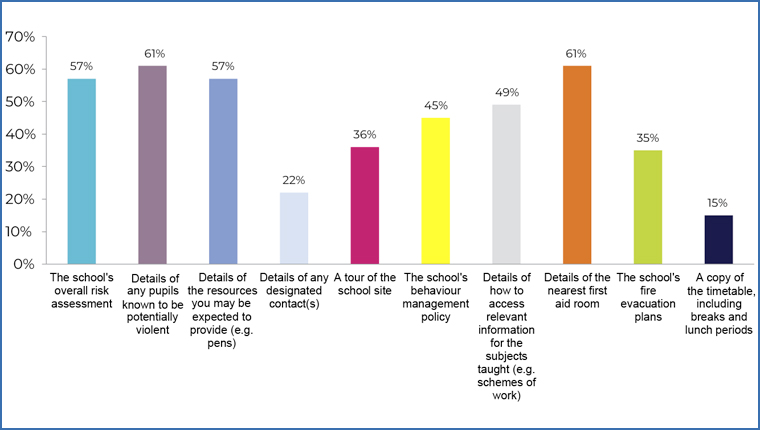
Access to facilities and amenities in schools when undertaking assignments
When asked about access to facilities and amenities when undertaking assignments in schools during the 2023/24 academic year, just over a third of supply teachers (34%) stated that they do not always have access to staff rooms where they were available, three fifths (60%) stated that they do not always have access to staff food and drink facilities, and 18% said that they do not always have access to toilet/washroom facilities. Half of supply teachers (50%) reported that they do not always have access to car parking.
When asked about the assignments undertaken during the academic year 2023/24, just over half of supply teachers (52%) reported that they had access to a designated contact person all of the time, whereas just under a third (32%) reported having access to a designated contact person some of the time. Sixteen per cent of supply teachers reported that they did not have access to a designated contact person.
60% of supply teachers stated that they do not always have access to staff food and drink facilities when undertaking assignments
Issues and concerns, including health and safety, for supply teachers
Just under a quarter of supply teachers (24%) stated that they do not feel that any issues and concerns they have raised are taken seriously and a quarter (25%) stated that they didn’t know.
It’s often a case of you are only there for a short time, so it’s rarely taken seriously.
The schools always listen to me. I am an experienced teacher, have been employed in schools where pupils’ behaviour is challenging and schools ask me back.
Just over a third of supply teachers (34%) who secured work during the academic year 2023/24 stated that they were concerned about their health and safety when undertaking supply work in schools and just under one in ten supply teachers (8%) thought that they may have been penalised or had work cancelled for disclosing personal information about their health and safety (e.g. pregnant).
Have not declared worsening health for fear of repercussions.
Rates of pay for supply teachers
In respect of rates of pay, supply teachers who were able to secure work through an agency/agencies on the National Procurement Service (NPS) were asked if they had been paid in line with at least the equivalent rate of M2 (£157.66) for the academic year 2023/24.
Just over four fifths of supply teachers (81%) reported that they had been paid in line with at least the equivalent rate of M2, whereas 15% of supply teachers stated that this was not the case.
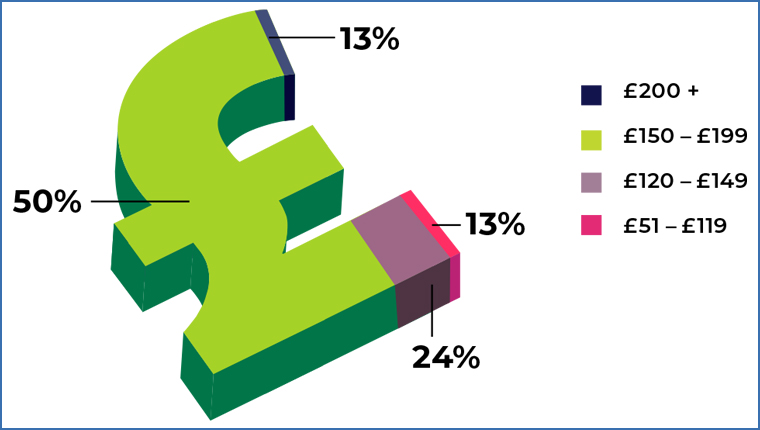
For those supply teachers who were not paid in line with the arrangements set by the NPS for the academic year 2023/24, over one in ten (13%) stated that they were paid between £51 and £119 per day for assignments, just under a quarter (24%) stated that they were paid between £120 and £149 a day, and half (50%) stated that they were paid between £150 and £199 a day for assignments. Over one in ten supply teachers (13%) stated that they were paid £200 or more per day for assignments.
Well in excess of half of supply teachers (54%) indicated that the rates of pay received during the academic year 2023/24 were the same as those they were able to earn in the previous academic year, whereas 17% reported that the rates of pay received were less than those they were able to earn in the previous academic year. Over a quarter (28%) said that the rates of pay received had increased from those they were able to earn in the previous academic year.
I think we should be paid according to the pay scale. I get paid the same as a new teacher, though I’ve been teaching nearly 20 years.
When asked if the agency/agencies where they undertook work during the academic year 2023/24 operated a ceiling in respect of their remuneration, just under half of supply teachers (49%) reported that the agency/agencies did.
Agency state flat rate payment for all supply teachers, irrespective of experience.
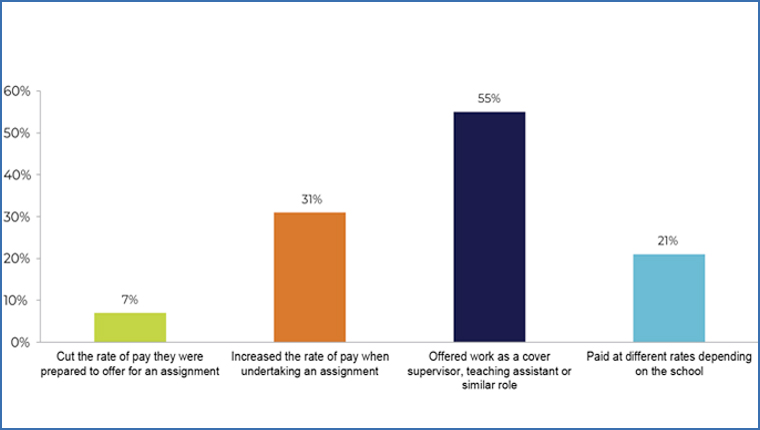
30% of supply teachers stated that they had been able to negotiate or secure an increase in their daily rate with an agency/agencies during the 2023/24 academic year
Rates are different for different schools, especially primary schools. Different rates for different roles.
I negotiated a slightly higher rate for schools further away.
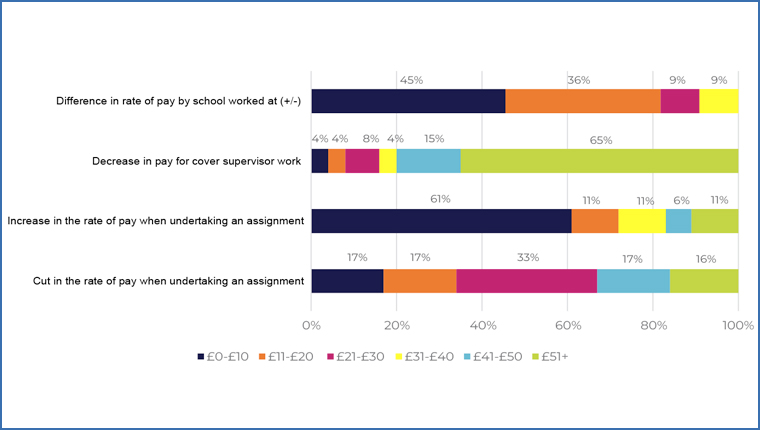
18% of supply teachers stated that they were able to secure more money when working through a local authority or directly with a school in comparison to supply work through an agency
I only got one day from the local authority, despite being on their books for a year. It paid £60 more than an agency.
£85 more per day.
£40 [more] per day, plus much better pension.
Financial situation
Supply teachers were asked about their financial situation during the academic year 2023/24.
Well in excess of two fifths of supply teachers (46%) reported that they had sourced work other than in teaching during the academic year 2023/24. Of those, just under nine out of ten (88%) stated that the work sourced elsewhere other than teaching failed to provide the same level of financial income they would have obtained had they been able to secure work teaching.
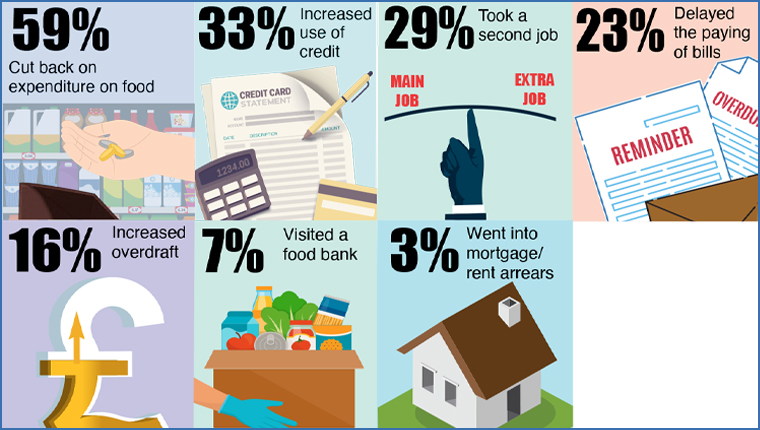
Just under a fifth of supply teachers (18%) reported having to claim some form of state benefit during the academic year 2023/24 (e.g. Universal Credit) and well in excess of half of respondents (57%) stated that they had experienced financial hardship as a supply teacher over the same period.
57% of respondents stated that they had experienced financial hardship as a supply teacher
More careful in spending/budgeting.
I’ve cancelled life insurance. I live in a cold apartment, all to save on electricity. Zero indulgence, no holiday and no social life.
Without the assistance of Universal Credit every month, a personal loan (August 2023), food banks, benevolent funding/one off grant support, and council tax and utility bill reduction, I would not have been able to survive (literally) on what I have been able to make as a supply teacher.
Just under seven out of ten supply teachers (69%) who responded stated that undertaking supply work, and the inability to secure a permanent post, had affected their ability to make significant life decisions
Pensions
Whilst the legislation prevents supply teachers working for a supply agency from paying into the Teachers’ Pension Scheme (TPS), over two thirds (68%) stated that they are still members of the TPS. Of these, over a third (36%) reported that they were active members, two fifths (40%) reported that they were deferred members, and just under a quarter (24%) reported that they were drawing a pension.
Of those supply teachers who indicated that they were not members of the TPS, a quarter (25%) reported that they did not have any alternative pension scheme provision and over one in ten (12%) reported that they were unsure.
I have a NEST pension with New Directions.
The pension schemes offered by agencies are not a patch on the TPS.
Waste of effort. Made to pay in by agencies. Teaching agencies should have compulsory use of the TPS for all teaching work.
NEST is no good! Way too low. Supply teachers need access to the TPS or they will be on benefits when they reach pension age.
Training and behaviour management support
Under two fifths of supply teachers (37%) stated that they had not been given access to continuing professional development (CPD) in the last 12 months.
For those supply teachers who had access to CPD, the primary sources of training were obtained via a supply agency (80%), the schools at which they worked (24%), funded personally (12%), or from their trade union (9%).
37% of supply teachers stated that they had not been given access to CPD
In regards to participating in in service training (INSET) days provided by schools during the 2023/24 academic year, just 16% of supply teachers reported that they were asked to participate in INSET days in all the schools where they undertook assignments, whereas just over one in ten (11%) reported that a few of the schools asked them to participate in INSET days.
Under three quarters of supply teachers (72%) reported that they were not asked to participate in any INSET provided by the schools where they undertook assignments.
I was mostly day to day supply, so I missed out on any CPD opportunities and INSET days which is a shame because as a supply teacher, I feel it’s needed more than anyone.
The National Supply Pool for Wales
Just under half of supply teachers (49%) stated that they were aware of the National Supply Pool for Wales.
For those supply teachers who were aware, over a third (36%) stated that they had signed up to the National Supply Pool for Wales.
Furthermore, none of the supply teachers who reported being aware of the National Supply Pool for Wales stated that they had received any supply work through it.
It’s absolutely useless.
The National Supply Pool for Wales at the present time is a bit like a mirage in a desert. You’re over the moon to see it, but when you get closer it disappears, i.e. no communication about work at all.
I have been a supply teacher for over a decade. I was on the Upper Pay Scale when I left a mainstream school. Since then, I have earned the equivalent to a new teacher. I have no sick pay or holiday pay.
The lack of support, respect and stability, in addition to the poor rate of pay and the horrific ordeal I have been through over the last term makes supply teaching extremely unappealing.
I am very stressed at the prospect of returning to supply work through an agency in September. This academic year, I have been under a local authority contract and paid at UPS3. I will be losing a substantial amount of money by returning to agency work in September. I will not be able to cover my mortgage, bills and debts accumulated when working for agencies, which are essentially employing you on a zero hours contract, with no holiday or sick pay.
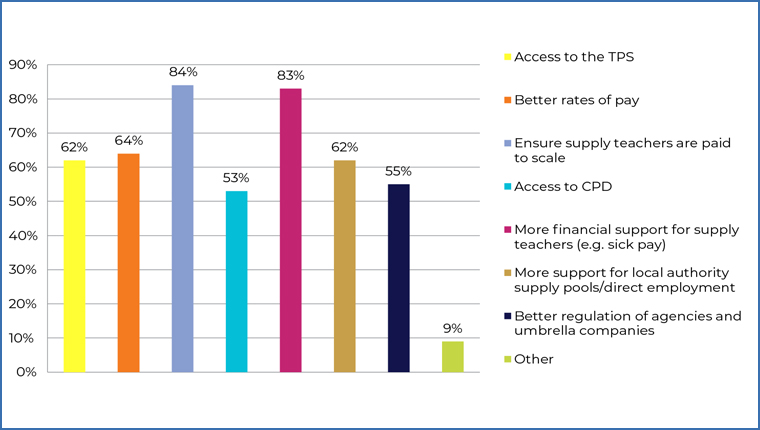
Just under two fifths of supply teachers (37%) reported that they did not feel they are treated with respect and dignity
Feel treated like a scapegoat and second rate citizen by some staff, particularly when they refer to you as ‘supply’ and not a ‘supply teacher’.
In one school, the staffroom had a code; I was not given the code. I did not know where the toilets were and was not told. I had to ask a pupil. They had a code, so I could not use them. I asked a member of staff, they opened them for me, but they did not give me the code!
Conclusion
The survey of supply teachers emphasises the crucial role that supply teachers have played in schools in Wales during the 2023/24 academic year.
However, the survey suggests that the experiences of supply teachers throughout the 2023/24 academic year have been varied. For some supply teachers, the opportunities for work have increased, whereas others have found that they have been forced to travel further in order to secure work, despite the ongoing cost of living crisis.
Despite the introduction of the NPS and a commitment to pay in line with the daily rate of M2 (£157.66 for the academic year 2023/24), there has been a significant increase in those reporting that agencies are not paying in line with this.
In addition, the increase in the number of supply teachers reporting that they were earning less than they were during the previous academic year, as well as the increase in those reporting that agencies are operating a ceiling for remuneration (irrespective of experience and expertise), it is no surprise that a significantly greater number of supply teachers in Wales have reported having to source work elsewhere other than teaching.
Given this, and coupled with the vagaries of intermittent and insecure employment, more supply teachers have had to make tough decisions about their financial situation, including cutting back on their expenditure on essential items, such as food and heating. Some supply teachers have even been forced into mortgage/rent arrears, as well as rely on food banks.
Furthermore, the 2023/24 survey indicates that many agencies and schools are still routinely failing to provide key information to qualified and dedicated supply teachers, including in regards to the pupils they are expected to teach, as well as critical health and safety information to enable them to safely discharge their duties.
There are concerns that these disparities in treatment are impacting disproportionately on women, Black and minority ethnic (BME) groups and disabled teachers, who are more likely to be employed as supply teachers.
In this context, the results from the 2023/24 survey substantiate the pressing need for a better deal for supply teachers which recognises and values the important and significant contribution they make to the education system in Wales.
The full survey report can be downloaded on the right/below.
